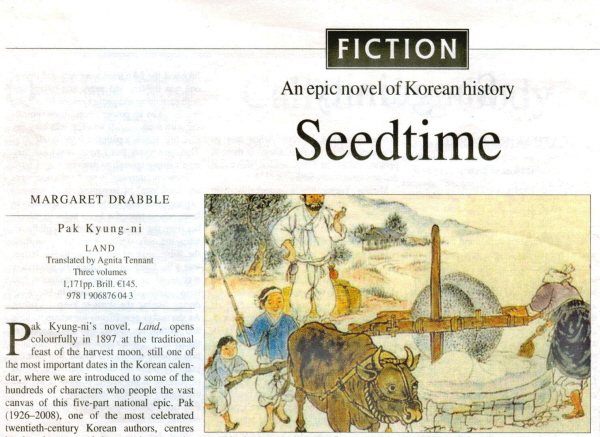 |
 “Hãy săn sóc Mẹ” làm thế giới để ý đến văn chương Hàn Quốc, nhưng bộ sử thi này mới bảnh, theo TLS, June 24, 2011 TLS điểm Làm ơn săn sóc Mẹ, PLEASE LOOK AFTER MOTHER , cuốn tiểu thuyết thứ bẩy, và là cuốn đầu tiên được dịch qua tiếng Anh, của 1 tiểu thuyết gia Hàn Quốc, Kyung-sook Shin, mà nguyên tác được bán ra là 1, 5 triệu ấn bản.
Left behind, bị bỏ lại
phía sau: Đọc bài điểm không thôi, là GNV đã rùng
mình, nhớ đến cái xứ Bắc Kít của Gấu, và rồi, bồi hồi, lầu bầu, giá như
mình viết
ra được 1 cuốn như thế này, nhỉ!
Left behind KELL Y
FALCONER Kyung-sook
Shin PLEASE LOOK
AFTER MOTHER Translated by Chi-Young Kim 272pp.
Weidenfeld and Nicolson. £12.99. 978 0 297 86073 0 Park So-nyo
is sixty-nine years old when she disappears from Seoul's main
Underground
station; boarding a train, her husband realizes too late that he has
left her
behind on the platform. This event follows the pattern of their
fifty-year marriage:
he was always walking too fast for her and she was always asking him to
slow
down. He returns on the next train but she is nowhere to be found,
though the
grainy CCTV images show her stooped, disheveled figure staring
bewildered into
space, then stopping to squat and rest. Characteristically, her husband
does
not remember what shoes his wife was wearing; he thinks they were beige
slip-ons but in fact they are blue-plastic sandals that allow a
long-festering
sore to breathe. In due course the wound becomes infected and grows so
deep
that it exposes bone. Mr Park and
his wife were travelling to Seoul to celebrate their birthdays with
their four
adult children, who have moved away from the countryside where they
were
brought up and who now believe themselves to be urban and civilized,
having
thrown off the yoke of the "country-bumpkin". This, like Mr. Park's
leaving his wife behind, is also reflective of the situation in South
Korea, a
country which has undergone a rapid and successful modernization since
the end
of the Korean war. Please Look After Mother, in particular So-nyo's
story,
begins shortly after the country was divided when its people led
primitive
impoverished lives. So-nyo's terror of being unable to find the next
meal for
her children is strong, and we realize how resourceful and hard-working
she was
to ensure that they never went hungry. When she wasn't tilling the
fields, she
would breed silkworms and brew malt and help to make tofu. Sometimes
she would sell a tatty lamp, a warm ironing stone or an old jar to
people out
of town. They wanted the antiques she was using .... Mother's labor
showed that
nothing would be reaped if the seeds were not sown. But in the
twenty-first century, her children seem to have forgotten the past, and
So-nyo
wonders if "things that are happening now are linked to things from the
past and things in the future". Her grandchildren, she thinks, were
"dropped out of the blue ... they have nothing to do with me. Nothing
to
do with me at all". The novel
can be read on several levels, as a metaphor for the impressions of the
past as
they linger in the present, and as a story of mothers and children,
husbands and
wives. It describes one woman's self-sacrifice so that the next
generation may
realize their dreams, instead of putting them to the side as she had
to.
Indeed, So-nyo had disappeared
long before that day on the station platform, and it is only in
retrospect that
her family understand and appreciate her. Thematically and
stylistically,
Please Look After Mother has something in common with the filmmaker
Yasujiru
Ozu's Tokyo Story as it reveals the
emergence of a post-war metropolitan society in the twentieth century.
Similarly Confucianism, with its rites of ancestor worship and its
emphasis on
respect for one's elders, struggles to maintain its stronghold when
families
are dispersed; children are too busy to lay the wreaths of remembrance
and the
older generation are seen as holding the present generation back. So-nyo is
what we might call an Earth Mother, but for her it is out of necessity,
rather
than choice. It is one of the novel's ironies that her eldest daughter
is a
successful novelist who does not realize until too late that her mother
could
not read; this is yet another tragedy of So-nyo's secret, sublimated
life. Please Look
After Mother is a captivating story, written with an
understanding of
the
shortcomings of traditional ways and modem life. It is nostalgic but
unsentimental, brutally well observed and, in this flawlessly smooth
translation by Chi-Young Kim, it offers a sobering account of a
vanished past.
It is the seventh novel by the much-praised Kyung-sook Shin and the
first to be
translated into English after a best-selling 1.5 million print run that
changed
the face of publishing in Korea in 2008. We must hope there will be
more
translations to follow. TLS APRIL 29
2011
|